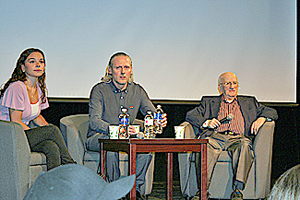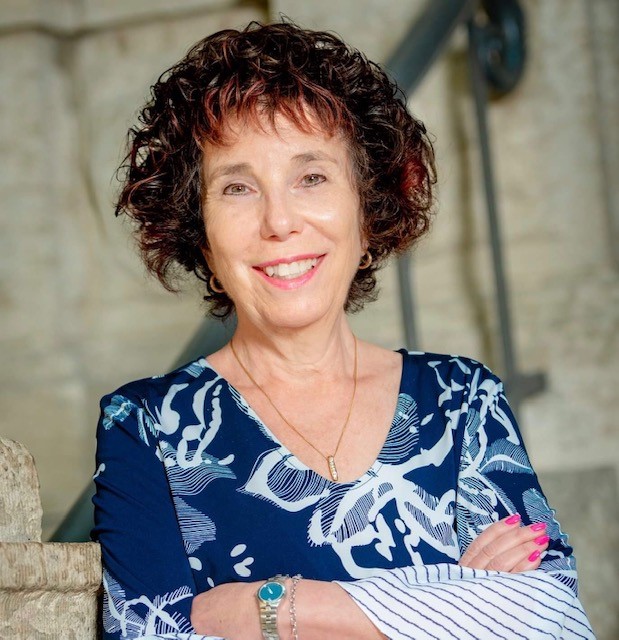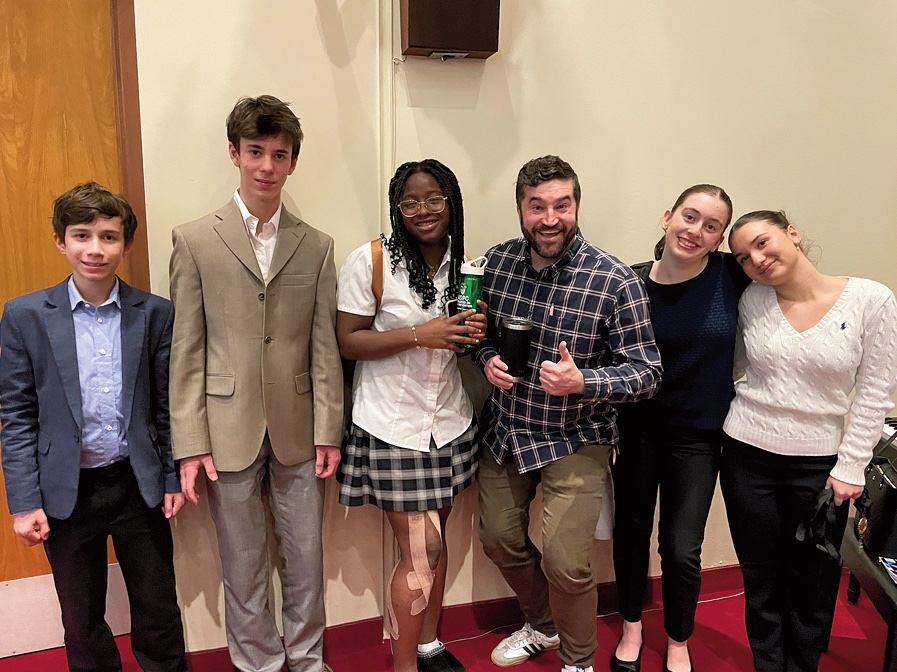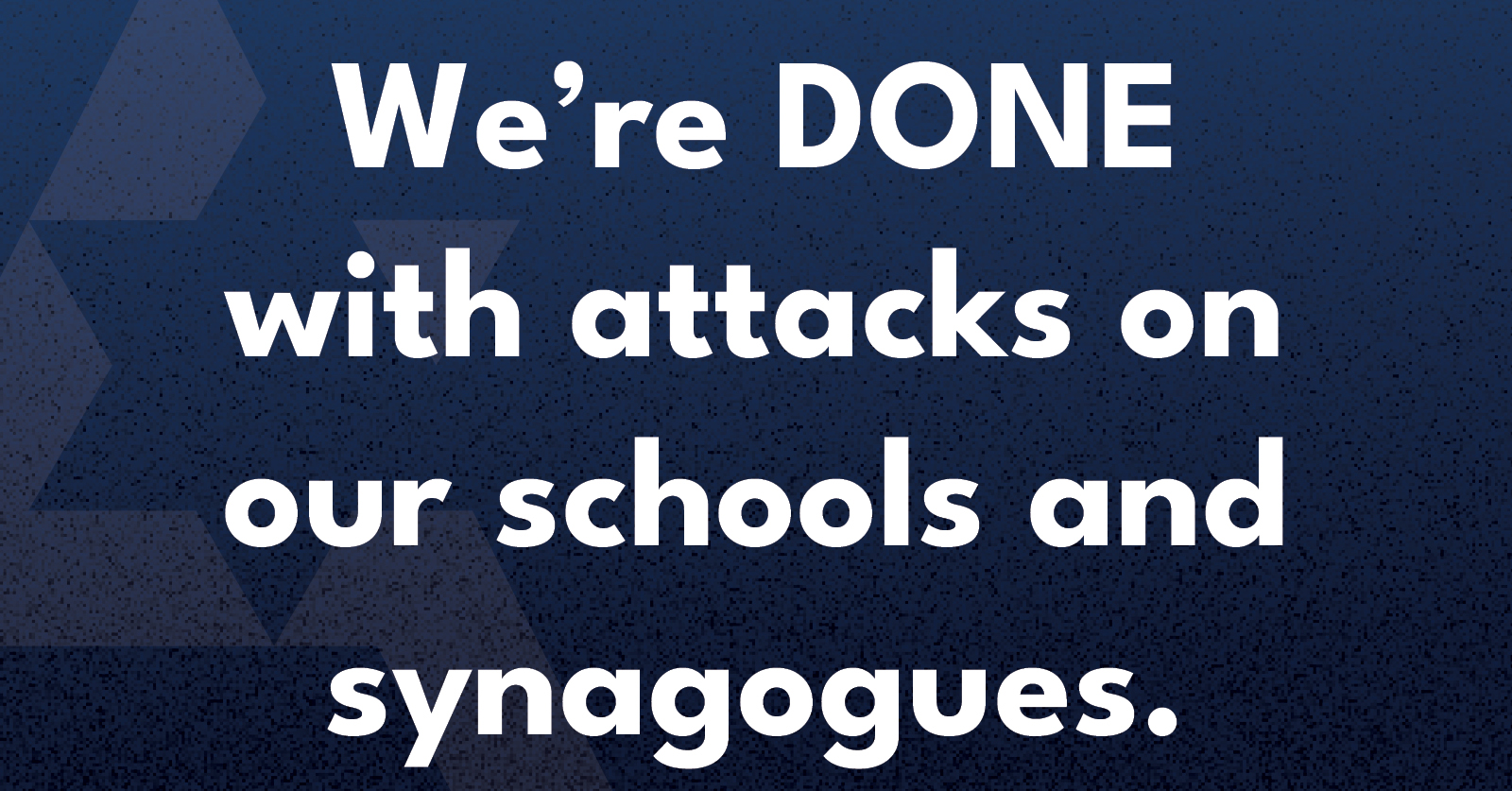Local News
New film about 94-year old Holocaust survivor Isaac Gotfried premieres at Berney Theatre

By BERNIE BELLAN
For 94-year-old Isaac Gotfried. telling the story how he survived three years in various slave labour and concentration camps during World War II has been his mission in life for over 26 years now.
In 2018 I recorded a talk Isaac gave to 32 Muslim students from a school in St. Boniface. A video of that session can be seen on our website at http://jewishpostandnews.ca/ categories-media/78-shoah/227-isaac-gotfried. During that talk Isaac noted that, at that point in his life, he estimated that he had spoken at over 100 schools to over 20,000 students.
This past Wednesday, March 11, an audience in the Berney Theatre had the opportunity to watch a brand new film which also showed Isaac interacting with students from a different school, this time J.H. Bruns Collegiate, which is also in St. Boniface.
The occasion was the world premiere of a new film titled “Tikkun Olam”. The film was produced by Yolanda Papini-Pollock, who is not only the founder of Winnipeg Friends of Israel, she is a documentary film maker of some renown who, four years ago, produced an excellent documentary about four survivors of different genocides titled “Never Again: A Broken Promise”.
This time though, Yolanda took a more sophisticated approach to her film about Isaac Gotfried, inter splicing footage and stills from World War II with scenes of Isaac meeting students from J.H. Bruns last spring and this past fall.
The film is partly narrated by a student by the name of Kaitlin Medeiros, who graduated from J.H. Bruns last year. It also focuses on the efforts of a teacher by the name of Tim Beyak to introduce teaching about the Holocaust to students whose understanding of what went on in World War II was somewhat limited. According to Beyak, after he was introduced to Yolanda Papini-Pollock over two years ago, the idea for making this particular film took root. To give the students in the film quite a bit of credit, however, many of the students whom we see during the course of the film were well aware of what the Holocaust was prior to meeting Isaac. As one might expect though, the details that Isaac Gotfried shared with them about his own personal experiences came as a total shock to the vast majority of them. One scene in particular – when Isaac describes the depravity of Ilsa Koch, who was the commandant of Buchenwald concentration camp, and who was known as the “Bitch of Buchenwald”, the students’ mouths were left agape.
In my 2018 story about Isaac Gotfried, I referred to Isaac’s having seen Koch in person and his description of her own particular brand of sadism: “…Isaac came face to face with the ‘Bitch of Buchenwald’ – Ilse Koch, a woman who was so sadistic that she would choose men to sleep with during the night, then have them shot the next morning.” In the film Koch’s penchant for taking the skins of those men and turning them into lampshades is shown in graphic detail.
Isaac Gotfried has written his autobiography, “Lucky to Survive”, which was published in 2017. In introducing her film to the Berney Theatre audience, filmmaker Yolanda Papini-Pollock told the audience that “Isaac was a young boy (living in Poland) when the Nazis invaded.” (He would have been 13.)
“Despite everything that happened to him though,” Yolanda continued, “Isaac considers himself lucky. He has dedicated his life to sharing his story with students of all ages.”
The film doesn’t recount too much of the detail of what happened to Isaac during the war, although he does tell one harrowing story to the students at J.H. Bruns that he has told to thousands of students before, and about which I wrote in my 2018 article about Isaac:
“Toward the end of his captivity, Isaac said, one night, when he was sleeping in his bunk – and there were eight men assigned to bunks designed to hold only two, he had a pain on his side and he wanted to turn over to the other side. He tried to move the man next to him so that he could turn over, but the man didn’t move. He was dead. So Isaac said he turned back to the man on his other side; he, too, was dead.
“ ‘I was sleeping between two corpses,’ Isaac said to the students.”
Within the documentary, “Tikkun Olam”, we learn that there is a subtext to the story of Isaac meeting with students at J.H. Bruns, and that is the hugely diverse backgrounds of the students themselves. There are students from all over the globe represented in the film – including one transsexual student who relates their own particular experience of having been bullied at school. Later, when asked what their takeaway is after having met Isaac, many of the students say that they have a newfound appreciation of what it means to be discriminated against.
Later, after the movie was shown, Isaac Gotfried sat on the stage with Tim Beyak and Kaitlin Medeiros, and the three of them fielded questions from the audience.
One of the questions related to the point of what was the impression left with the students at J.H. Bruns after having met Isaac: “Did you see a change in attitude toward bullying after Isaac spoke at your school?” the questioner asked
Kaitlin Medeiros responded: “For sure – I think seeing something as traumatic as the Holocaust makes you realize how trivial your own problems seem.”
Following the showing of the film and the question and answer session audience members gathered in the Berney Theatre foyer for refreshments – and a chance to meet Isaac and buy his book. I asked Yolanda Papini-Pollock whether she has plans to show the film at other venues.
Yolanda explained that, due to the COBID-19 virus, 27 residents of the Shaftesbury Retirement Residence who had planned on attending the Berney Theatre for the premiere of the film were unfortunately kept from boarding their bus. As a result plans are being made to show the film at the Shaftesbury itself.
As well, Yolanda said, she will be sending the film to various film festivals around the county and it will be one of the films shown at the upcoming Rady JCC Jewish Film Festival. Yolanda added that she is hoping to find an educational distributor who will show the film at more schools.
Local News
Cheryl Hirsch Katz, Jewish Child and Family Service’s longest serving staffer, set to retire at end of the month

By MYRON LOVE “I loved working at Jewish Child and Family Service,” says Cheryl Hirsh Katz, who is due to retire at the end of June. “I have always appreciated the warm and welcoming atmosphere here. I feel that the people working here are my extended family. I am going to miss my colleagues”.
“I have derived great satisfaction over the years to have been able to help many people in our community of all ages through my work at JCFS,” she continues.
After 44 years at the agency, Katz, the longest-serving member of the staff, was given an appreciative send-off at the JCFS’s recent (June 23) Annual General Meeting at the Shaarey Zedek Synagogue.
The daughter of Art and Bess Hirsh, Cheryl grew up in Garden City. She attended Peretz School, then Jefferson Junior High and Garden City Collegiate. She joined the staff of JCFS in 1981, shortly after receiving her Bachelor of Social Work degree.
She earned an MSW in 1990.
“I chose to become a social worker,” she recalls, “because I always wanted to be able to help people.”
Katz was originally hired by JCFS to work with newcomers. After a couple of years, she was given responsibility for looking after the needs of older adults.
“I really enjoyed working in older adult services,” she says. “That is where I spent the bulk of my time at JCFS.”
After ten years as a case worker, she was promoted to a supervisory role. Later, she was also given responsibility for mental health and addictions programming and settlement services, while keeping the older adult files under her purview.
“As a supervisor, I wasn’t directly involved with individual clients,” she points out. “I was more involved with programming. Among the programs for seniors we organized were – for example – sessions on elder abuse, digital storytelling and memory loss.”
She notes that one of the trends she has seen over the last 44 years is that people are living longer and living in their homes longer. A lot more of our clients are living well into their 90s,” she observes. “We have had to continually expand our staff and the services we provide in order to accommodate the growing demands of an aging population.”
She also spoke of the mental health needs of seniors and aging Holocaust survivors.
She says that she has mixed feelings about leaving JCFS. “After so many years working full time, I am going to have to create a new routine,” she comments.
She notes that, now that she is retired, she will have more time to spend with her parents – who are in their 90s.
And then, there are the two dogs to look after. “I will have time now to try new activities,” she says. “ I might learn to play mah-jong.”
She speaks about maybe doing some traveling – although her husband, Murray, is still working full time.
(She and Murray have one daughter, Farah.)
“Retirement may also include some volunteering,” she adds.
It is quite likely, she will be continuing her association with JCFS but in a volunteer capacity.
Local News
Gray Academy students shine in provincial, national debating competitions

By MYRON LOVE It has been another good year for Gray Academy’s high school students who participated in provincial and national debating competitions. The best results were recorded by Grade 9 student Noa Mednikov, who finished fourth overall nationally, fourth in interpretive reading, and fifth in persuasive speaking at the junior National Public Speaking Championship in early May in Vancouver.
Last October, in the Junior Provincial British Parliamentary Championship – which was held at St. John’s-Ravenscourt – Noa and her partner, Raya Braunstein, finished third as a team while Raya placed third in individual debating.
Their fellow Grade 9 student Maxim Moscalenkov tied for first in persuasive speaking in Vancouver, while the Gray Academy team of Gabe Tapper and Aaron Koplovich finished fifth. Aaron also finished fifth in his individual debate.
Earlier, in March, Maxim finished fifth in the Provincial Juniors debating competition, which was held at Balmoral Hall He and his debate partner, Nate Shenkarow, finished seventh among the teams entered. Last November, he and partner, Ethan Tenenbein, finished seventh in the Junior Prepared Tournament – just behind the Gray Academy team of Nate Shenkarow and Jack Kay.
At the senior high level in that competition, the team of Jacob Tenenbein and Jonah Novoseller finished fourth and Jacob was recognized as fifth best in an individual capacity. Jonah and Jacob also paired up to win the Asper Cup, which was held at their home school.
Jacob represented Manitoba at the Junior National Speech Championship in Vancouver in May and, last October, he and Grade 12 Gray Academy students Julie Krozkin and Daniel Bokser represented Canada at an international debating tournament in Bermuda.
Gray Academy’s debating program was introduced by Linda Martin in 2003. She also led the debating teams at Balmoral Hall. In 2011, Martin was succeeded by Gray Academy high school English teacher Andrew Kaplan.
“Andrew has done a wonderful job with the debating program” says Martin, who has a debating trophy at Gray Academy named in her honour, as well as a provincial trophy for best individual junior debater. “Over the years, Gray Academy students have done very well in many local, national and international competitions,” she adds.
About three weeks ago, this writer had the opportunity to sit down with Andrew Kaplan and six of the school’s top debaters while they discussed the benefits of learning how to debate. According to Noah Strauss – who competed in the Junior Provincials at Balmoral Hall in March, public speaking leaves him with a feeling of accomplishment.
“It’s a good skill set to have,” he observes. “It builds confidence.”
“A benefit of being able to debate is that you learn how to convince people that you know what you are talking about,” adds Maxim Moscolenkov.
Raya Braunstein notes that being able to debate is a skill that she expects to be helpful in many university courses which she may choose to take.
As Andrew Kaplan notes, the ability to express yourself has a great impact in whatever career you choose to pursue.
He points out that debating is compulsory at Gray Academy for all Grade 7 and 8 students – and students can continue debating as an option in the higher grades
Of course, competitive debating is not for everyone. For those students who opt to take that path, the journey begins with internal school debate competition – with the top debating teams and individuals qualifying for local tournaments and – potentially – beyond.
Andrew Kaplan reports that a small number of high schools in Winnipeg and southern Manitoba have active debating programs – including St. Johns Ravenscourt, St. Paul’s High School, St. Mary’s Academy, Garden City and Maples Collegiates in the Seven Oaks School Division, St. Maurice (a Catholic School), as well as Morden Collegiate and Dasmesh, a Sikh private school.
Kaplan expresses his appreciation to the Asper Foundation and an endowment spearheaded by the Kives Family for providing funding for the Gray Academy debating program – as well as the Andrew Slough Foundation – which was established by his friends in memory of the outstanding former Ravenscourt student debater and lawyer who passed away suddenly two years ago at the still young age of 38.
I am confident that our Jewish community can look forward to the continued success of Gray Academy’s star debaters and to the continual emergence of future stars as the times goes by.
Local News
Antisemitism has crept into grade school in Canada

Antisemitism in Canada has moved beyond protests and politics; it is now entering classrooms and altering how Jewish children see themselves functioning within them.
A a university student I have observed the experience of my younger brother in grade eight as a Jewish student. Over the past few months, his school has been at the center of several deeply troubling incidents that have made him feel unsafe in our parks, community, and even his school. Swastikas were drawn around the community, in parks and ponds. Additionally, an older man, who claims to be a pro-Palestinian influencer, stood outside his predominantly Jewish school wearing a keffiyeh, filming a video which then circulated between students on TikTok.
This same man later showed up to our local Jewish community center in keffiyeh to allegedly watch his son play basketball where my brother and many of his classmates go for their lessons, basketball games, and Jewish events. These moments made him and his peers feel watched and targeted just for being Jewish. Local political representatives condemned the incidents and raised awareness about antisemitism, but the fear among students didn’t go away. The feeling of being targeted for simply existing has been taught to my brother, something my parents had tried their hardest to escape from.
Most recently, my brother was chosen to represent his school at a regional science fair. When one of the judges arrived wearing a keffiyeh, he froze. For many, including my brother after the incidents he has faced, the keffiyeh represents a political message. But even more so for my younger brother, it is tied to the fear and intimidation he had already experienced. He felt nervous, distracted, and unsure of how to act.
This is not about silencing political expression. It is about a child who came to share his ideas and left feeling uncertain and afraid. It is about the atmosphere forming in Canadian schools, where Jewish students are being made to feel targeted and unwelcome.
His school made an effort to address the incidents, but the impact is lasting. Posts on social media, much can be very vague at times about inclusion cannot fully undo the feeling of being singled out. A kind word from a teacher does not erase the fear that builds when threats are left unspoken but deeply felt.
I am writing this as a sister who watched her younger brother lose a moment that should have been filled with confidence and pride. He deserved to feel safe. So do all Jewish students in this country.
Moving forward, schools must take concrete steps to protect all students. Antisemitism cannot only be addressed when it becomes violent or overt. It must also be recognized when it appears as intimidation, symbolic targeting, or political messaging that creates fear among students. Children should never have to question whether they are safe in their own classrooms or community spaces.
Events that are meant to support and celebrate students must remain focused on them. Individuals who feel the need to bring political symbols or messages into school grounds or children’s events should not be welcomed in those spaces. Schools must make it clear that their environments exist to support learning, safety, and inclusion, not to host agendas that can intimidate or isolate students.
Administrators and educators must develop clear guidelines for identifying and responding to antisemitic behavior in all its forms. This includes strengthening security measures, offering ongoing staff training, and engaging directly with Jewish families to understand their concerns. Inclusion is not a one-time statement. It is a responsibility that must be reflected in everyday decisions and actions. No child should ever feel unsafe or unwelcome because of their identity.
The author is a Campus Media Fellow with HonestReporting Canada and Allied Voices for Israel who lives in Toronto.
